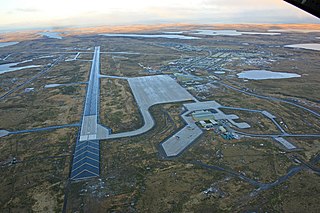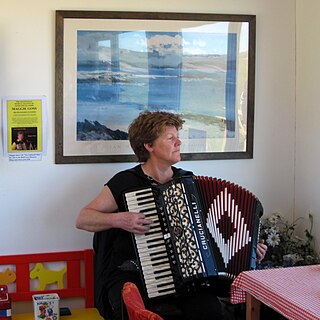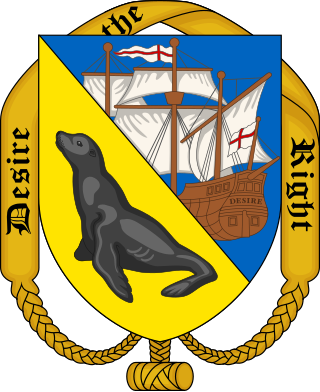
The history of the Falkland Islands goes back at least five hundred years, with active exploration and colonisation only taking place in the 18th century. Nonetheless, the Falkland Islands have been a matter of controversy, as they have been claimed by the French, British, Spaniards and Argentines at various points.

The Falkland Islands are located in the South Atlantic Ocean between 51°S and 53°S on a projection of the Patagonian Shelf, part of the South American continental shelf. In ancient geological time this shelf was part of Gondwana, and around 400 million years ago split from what is now Africa and drifted westwards from it. Today the islands are subjected to the Roaring Forties, winds that shape both their geography and climate.
The economy of the Falkland Islands, which first involved sealing, whaling and provisioning ships, became heavily dependent on sheep farming from the 1870s to 1980. It then diversified and now has income from tourism, commercial fishing, and servicing the fishing industry as well as agriculture. The Falkland Islands use the Falkland pound, which is backed by the British pound.
The Falkland Islands currently has three primary means of transport - road, sea and air. However, in 1946, when Sir Miles Clifford arrived as governor, there were no air services, no roads outside Stanley and an indifferent sea service. Sir Miles was instrumental in starting the Falkland Islands Government Air Service in December 1948. The inaugural flight involved a mercy flight from North Arm Settlement to Stanley to bring a girl with peritonitis to life-saving medical help in Stanley. There is now an international airport, a domestic airport, a number of airstrips, a growing road network and a much-improved ferry service between the two main islands.

The Falkland Islands are a British overseas territory and, as such, rely on the United Kingdom for the guarantee of their security. The other UK territories in the South Atlantic, South Georgia and the South Sandwich Islands, fall under the protection of British Forces South Atlantic Islands (BFSAI), formerly known as British Forces Falkland Islands (BFFI), which includes commitments from the British Army, Royal Air Force and Royal Navy. They are headed by the Commander, British Forces South Atlantic Islands (CBFSAI), a brigadier-equivalent appointment that rotates among all three services.

The Falklands War was a ten-week undeclared war between Argentina and the United Kingdom in 1982 over two British dependent territories in the South Atlantic: the Falkland Islands and its territorial dependency, South Georgia and the South Sandwich Islands. The conflict began on 2 April 1982, when Argentina invaded and occupied the Falkland Islands, followed by the invasion of South Georgia the next day. On 5 April, the British government dispatched a naval task force to engage the Argentine Navy and Air Force before making an amphibious assault on the islands. The conflict lasted 74 days and ended with an Argentine surrender on 14 June, returning the islands to British control. In total, 649 Argentine military personnel, 255 British military personnel, and three Falkland Islanders were killed during the hostilities.

Stanley is the capital city of the Falkland Islands. It is located on the island of East Falkland, on a north-facing slope in one of the wettest parts of the islands. At the 2016 census, the city had a population of 2,460. The entire population of the Falkland Islands was 3,398 on Census Day on 9 October 2016.

RAF Mount Pleasant is a Royal Air Force station in the British Overseas Territory of the Falkland Islands. The airfield goes by the motto of "Defend the right" and is part of the British Forces South Atlantic Islands (BFSAI). Home to between 1,000 and 2,000 British military personnel, it is about 33 miles (53 km) southwest of Stanley, the capital of the Falklands, on the island of East Falkland. The world's longest corridor, 2,600 feet (800 m) long, links the barracks, messes, and recreational and welfare areas of the station, and was nicknamed the "Death Star Corridor" by personnel.

East Falkland is the largest island of the Falklands in the South Atlantic, having an area of 6,605 km2 or 54% of the total area of the Falklands. The island consists of two main land masses, of which the more southerly is known as Lafonia; it is joined by a narrow isthmus where the settlement of Goose Green is located, and it was the scene of the Battle of Goose Green during the Falklands War.

Goose Green is a settlement in Lafonia on East Falkland in the Falkland Islands. It lies on Choiseul Sound, on the east side of the island's central isthmus, 2 miles (3.2 km) south-southwest of Darwin. With a population of about 40, it is the third-largest settlement of the Falkland Islands, after Stanley and Mount Pleasant.

The culture of the Falkland Islands is essentially analogous to that of British culture. The Falkland Islands have a large non-native born population, mainly white and from England, but also from Saint Helena.

The Falkland Islands Defence Force (FIDF) is the locally maintained volunteer defence unit in the Falkland Islands, a British Overseas Territory. The FIDF works alongside the military units supplied by the United Kingdom to ensure the security of the islands.

Christ Church Cathedral, on Ross Road in Stanley, Falkland Islands, is the southernmost Anglican cathedral in the world. It is the parish church of the Falkland Islands, South Georgia and the British Antarctic Territories. The Parish of the Falkland Islands is part of the Anglican Communion. The rector of the cathedral is under the ordinary jurisdiction of the Bishop of the Falkland Islands; since 1978, this office has been held ex officio by the Archbishop of Canterbury, who is both ordinary and metropolitan for the small autonomous diocese. In practice, authority is exercised through a bishop-commissary appointed by the Archbishop of Canterbury, and known as the Bishop for the Falkland Islands.

The Falkland Islands is an archipelago in the South Atlantic Ocean on the Patagonian Shelf. The principal islands are about 300 mi (480 km) east of South America's southern Patagonian coast and about 752 mi (1,210 km) from Cape Dubouzet at the northern tip of the Antarctic Peninsula, at a latitude of about 52°S. The archipelago, with an area of 4,700 sq mi (12,000 km2), comprises East Falkland, West Falkland, and 776 smaller islands. As a British overseas territory, the Falklands have internal self-governance, but the United Kingdom takes responsibility for their defence and foreign affairs. The capital and largest settlement is Stanley on East Falkland.

Falkland Islands English is mainly British in character. However, as a result of the remoteness of the islands, the small population has developed and retains its own accent/dialect, which persists despite many immigrants from the United Kingdom in recent years. In rural areas, known as 'Camp', the Falkland accent tends to be stronger. The dialect has resemblances to Australian, New Zealand, West Country and Norfolk dialects of English, as well as Lowland Scots.
Sport in the Falkland Islands is restricted by the islands' low, and generally scattered, population. Nonetheless, it has been able to send teams to the Commonwealth Games, and the Island Games.
The Falkland Islands Football League (FIFL) is the governing body of football in the Falkland Islands. The association operates the national team and the Stanley Services League, a domestic indoor football league on the islands. They also sponsor an all-star team from the league, called Stanley F.C., who occasionally play friendly matches against stationed troops on the islands and Royal Navy makeshift teams.

The climate of the Falkland Islands is cool and temperate, regulated by the large oceans which surround it. The Falkland Islands are a British Overseas Territory located over 480 kilometres (298 mi) from South America, to the north of the Antarctic convergence, where cooler waters from the south mix with warmer waters from the north.
A referendum on political status was held in the Falkland Islands on 10–11 March 2013. The Falkland Islanders were asked whether or not they supported the continuation of their status as an Overseas Territory of the United Kingdom in view of Argentina's call for negotiations on the islands' sovereignty.

Religion in the Falkland Islands is predominantly Christianity, of which the primary denominations are Church of England, Roman Catholic, United Free Church, Lutheran, Jehovah's Witnesses, Seventh-day Adventists among others. In the 2006 census most islanders identified themselves as Christian, followed by those who refused to answer or had no religious affiliation. The remaining 1.3 percent were adherents of other faiths.













